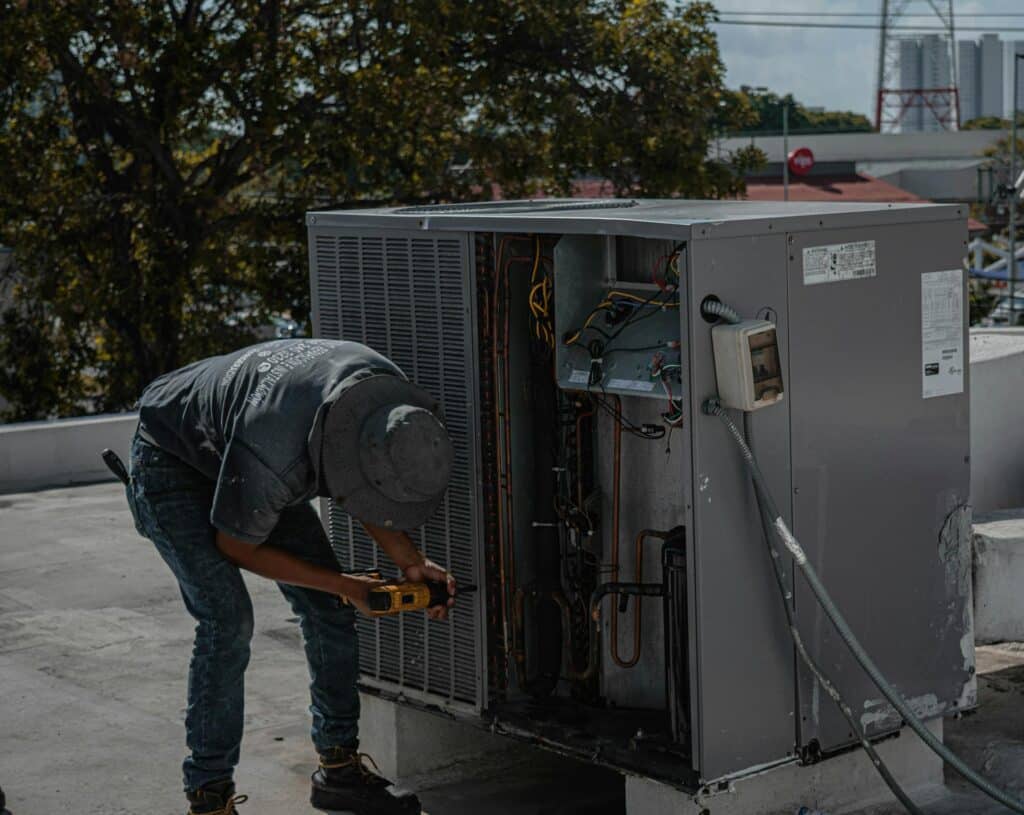What Is Typically Covered in a Home Warranty

Curious about your home warranty’s scope of coverage and wondering what is typically covered in a home warranty? Typically, a home warranty includes systems such as HVAC, electrical, plumbing, and appliances like refrigerators and washers – all prone to wear and tear. This article unpacks these coverages, additional options, and crucial exclusions in a way that is direct, uncomplicated, and tailored to help you determine the need and value of a home warranty for your household.
Understanding What Is Typically Covered in a Home Warranty: A Comprehensive Guide
Home warranties typically cover essential home systems like HVAC, plumbing, and electrical, as well as major appliances like refrigerators and washers, but do not include structural features or issues unrelated to regular wear and tear.
Home warranty exclusions often comprise pre-existing conditions, parts and components not related to normal functioning, and high-cost items like smart home systems; it’s crucial to understand these exclusions as they may impact claim eligibility.
While home warranties and homeowners insurance serve different coverage purposes, with warranties focusing on appliance/system wear and tear, homeowners should consider warranty costs, including annual fees and service charges, and choose reputable providers.
Overview of Home Warranty Coverage

A home warranty is more than just a piece of paper; it’s a lifeline when your home’s vital systems or appliances break down due to regular wear and tear. Most home warranty companies offer home warranty cover plans that include what a home warranty covers:
- HVAC
- Electrical
- Plumbing
- Major appliances like refrigerators and washers
However, keep in mind that home warranties don’t necessarily cover all aspects of your home. For instance, structural features and issues unrelated to wear and tear typically fall outside their purview. Despite this, home warranties offer invaluable protection, covering components and parts that succumb to standard wear and tear, saving you from high repair or replacement costs.
Systems Covered
When your home systems fail, it can disrupt your life and drain your wallet. Thankfully, most home warranties cover essential home systems like HVAC, plumbing, and electrical. This means that if your plumbing springs a leak or your electrical wiring becomes faulty due to wear and tear, your home warranty coverage kicks in. It should be noted, though, that while home warranty cover plumbing includes leakages and blockages in your plumbing system, it may not cover damage to the building caused by these leaks. Similarly, electrical system coverage includes attic vents, fans, and built-in exhaust units, but may exclude damage caused by improper maintenance or use.
Appliances Covered
In addition to home systems, home warranties commonly cover major home appliances like:
- refrigerators
- ovens
- washers
- dryers
This means that if your refrigerator’s cooling system fails or your oven stops heating, your home warranty coverage can shoulder the repair costs.
Remember, the goal of a home warranty is to protect you from unexpected expenses related to normal wear and tear of your appliances. However, make sure to delve into the specifics of your home warranty coverage to confirm the inclusion of your particular appliances and grasp any exclusions or limitations.
Optional Add-Ons

While basic home warranty plans cover a wide range of systems and appliances, you can customize your plan with additional coverage options for specific home systems and appliances. This means that if you have a sump pump, well pump, or septic tank plumbing, you can add them to your plan, even if they aren’t included in most basic warranties.
Home warranty providers also offer the option to include additional appliances, such as free-standing ice machines, trash compactors, and ceiling fans. However, the offerings for add-on coverage can differ significantly between companies. For example, air conditioning and roof leak coverage may be standard with some providers, while others offer them as optional coverage, or even home warranty cover windows.
Home Warranty Exclusions: What’s Not Covered?
While home warranties cover a wide range of systems and appliances, they are not limitless. Pre-existing conditions, identified through mechanisms such as a 30-day waiting period, visual inspections, and mechanical tests, can lead to claim denials as they are not covered by the warranty. Similarly, malfunctions due to improper maintenance, particularly in older homes with outdated systems where parts might no longer be available, are often not covered.
Home warranties also often exclude certain parts and components. For instance, ice makers in refrigerators, glass doors on stoves, and wiring for multimedia or security systems are usually not covered. In addition, home warranties are designed to address systems and appliances breakdowns caused by normal wear and tear, not cosmetic defects. Therefore, gaining insights into the exclusion clauses and limitations is vital – homeowners need to sift through the fine print to get a clear understanding of these conditions.
Structural Components

Structural components of your home, though crucial, are typically not covered by home warranties. For instance, windows are considered structural items and fall under homeowners insurance rather than home warranties. Similarly, doors are considered part of the home’s structure, not its systems and appliances, hence they are not typically included in home warranty coverage.
Even roof coverage under home warranties is usually limited. While some warranties may cover fixing leaks, they generally do not include complete roof replacement. Therefore, thoroughly scrutinizing the specifics of a home warranty contract is crucial to obtain a complete understanding of what’s covered and what’s not.
High-Cost Items
High-cost items, such as smart home systems, are often excluded from home warranty coverage. This is largely due to their expensive repair needs, which could easily exceed a policyholder’s annual premiums. Therefore, it’s imperative to confirm which items are encompassed in your home warranty to circumvent unexpected shocks in the future.
Bear in mind that while home warranties can provide significant financial relief in the event of an unexpected appliance or system malfunction, they are not a catch-all solution. Always make sure to thoroughly read your contract and understand the exclusions and limitations, including the manufacturer’s warranty coverage.
Comparing Home Warranties and Homeowners Insurance
Although they may seem similar at first glance, home warranties and homeowners insurance serve different purposes and provide different scopes of coverage. While home warranties are optional protections that homeowners may choose to purchase, homeowners insurance is typically required by mortgage lenders.
Homeowners insurance offers coverage for a property’s structure and belongings in case of incidents such as theft or natural disasters, including liability protection and additional living expenses if the home becomes uninhabitable. On the other hand, home warranties primarily assist with breakdowns from regular use and maintenance of home systems and appliances. This contrast underscores the different roles these two types of protection play in safeguarding your home.
The Cost of Home Warranties and Service Fees

While the protection offered by home warranties is invaluable, it’s equally important to consider the cost. The typical range for basic home warranty plans is between $350 to $600 annually, with some plans costing around $600 per year. If you opt for extended warranty coverage, you can expect to add an additional $100 to $500 to the annual cost of the basic home warranty plan.
In addition to the annual cost, there are also service fees for each repair visit, which usually fall between $50 to $100. The cost of a home warranty can significantly vary, influenced by the following factors:
- Choice of provider
- Size of the home
- Location
- Extent of coverage included
- The service fee for each repair visit
Therefore, it’s essential to weigh all these factors while budgeting for a home warranty.
How to Choose the Right Home Warranty Provider
Choosing the right home warranty provider is pivotal to ensure you get the best value for your money and the coverage you need. To begin, assess the type and amount of coverage needed based on the home systems and appliances to be protected, and select a home warranty provider offering a corresponding plan within your budget.
You should also:
- Compare several home warranty providers by obtaining free quotes and reviewing sample contracts for coverage details, limits, and the claims process.
- Seek recommendations from friends, family, neighbors, and local real estate agents for valuable insights.
- Examine provider reputations through third-party ratings like the Better Business Bureau and industry organizations such as the National Home Service Contract Association.
Making a Home Warranty Claim: The Process
When a covered item in your home falters, it’s essential to start the home warranty claim process straight away, as your home warranty coverage begin. You can make a claim using a variety of methods such as email, phone line, or through an online account, ensuring all necessary information is readily available.
Understanding the provider’s claim handling process is critical. Here are some important points to consider:
- Set response times: Make sure you know how long it will take for the provider to respond to your claim.
- Policies regarding service contractors: Find out if the home warranty company selects the contractors for repairs, as this may affect coverage if you choose your own contractor.
- Number of claims: There is usually no limit to the number of claims a homeowner can file on a home warranty covered item.
After making a claim, you can expect to be connected with a contractor within 24 to 48 hours, with technicians receiving direct reimbursement as home warranties pay claims for covered repairs from the home warranty company.
Evaluating the Value of a Home Warranty

While a home warranty may seem like an added expense, it can offer immense value, especially for homes with aging appliances or systems that are no longer covered by the manufacturer’s warranty. This is particularly true for existing homes with outdated systems or appliances; however, it’s often not recommended for newly constructed homes due to existing coverage from builders or manufacturers.
A home warranty can be a worthwhile investment, with many homeowners finding it provides value for its cost. In fact, a recent survey found that 67% of homeowners believe their home warranty provides value for its cost, with potential savings up to $20,000.
Top Home Warranty Companies of 2024
Choosing a reputable home warranty provider is key to securing reliable coverage. Among the top home warranty companies in 2024 are Rapid Auto Protection and more. These companies stand out due to their guarantees on the workmanship of outsourced repairs, which can range in duration.
However, it’s vital to confirm whether a home warranty company provides coverage in your state and offers plans that cater to your home’s specific needs. Therefore, always ensure to do your due diligence in comparing different home warranty providers and their offerings.
Summary
Home warranties offer protection for your home’s systems and appliances, shielding you from unexpected repair or replacement costs. From covering essential home systems like HVAC and plumbing to major appliances like refrigerators and ovens, home warranties provide a safety net against the financial strain of sudden malfunctions.
However, like any contract, it’s crucial to read the fine print and understand the exclusions and limitations of your home warranty. While home warranties can offer significant peace of mind and financial relief, they are not a one-size-fits-all solution. Therefore, assessing your specific needs, comparing different providers, and understanding the claim process are key to making the most of your home warranty.